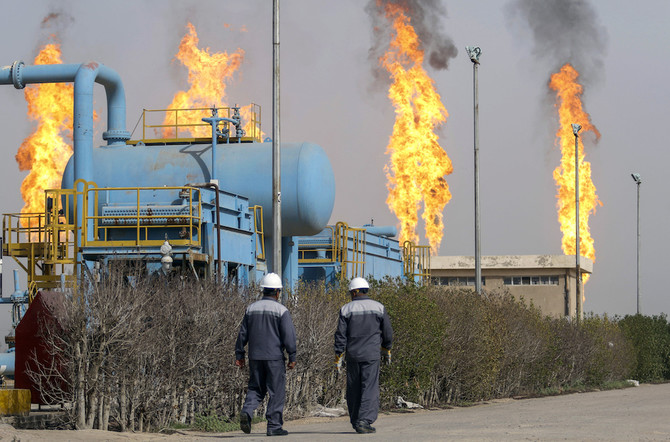BAGHDAD: Thousands of protesting tribesmen in southern Iraq have threatened to “paralyze” oil production if the hundreds of companies running the oil fields fail to employ them.
Tensions in Basra escalated after police opened fire to disperse protesters who had blocked the road leading to West Qurna, home of the largest oil fields in Iraq, on Sunday.
One demonstrator was killed and three wounded, medics and police said.
Security has been stepped up and international oil companies have moved senior staff members amid fears that the protests could escalate into rioting.
Several influential tribes, including Albu-Mansour, the tribe of the protester who died, demanded police hand over the officer who fired the fatal shot, and the commander who ordered him to shoot, or to prosecute them.
------
READ MORE: Oil firms’ multimillion-dollar bribery racket bringing death to the streets of Iraq’s Basra
------
As the Tuesday deadline approached, thousands more tribesmen joined the protest to block the road. Most oil company employees operating in West Qurna were not able to reach their work, sources told Arab News.
On Tuesday tribal leaders in Basra called on the oil companies to dismiss all staff not born in the area, including foreigners and Iraqis, and replace them with young workers from Basra.
Iraqi security forces in the city have been on high alert and dozens of additional troops have been deployed in the region “to control the consequences,” a police officer told Arab News.
The protesters have been demanding that at least 80 percent of the jobs offered by the oil companies should be guaranteed to the people of Basra. They are also calling for improvements to basic services in the city, such as the water supply which has become highly saline in recent years due to a drop in river levels.
“We want to force the government to listen to our demands and respond to them,” one of the demonstration organizers told Arab News. “We will paralyze the movement of oil companies.”
The organizer added that the oil companies are like “the hand that hurts the government, so we will twist it.”
In Basra about 800 foreign, Arab and local companies have Iraqi government approval to work in the oil sector.
Most of the companies have had to pay hundreds of thousands of dollars in bribes, commissions and compensation tribal heads who dominate local government in the province.
In April, Arab News reported how the murky web of bribes and corruption was fueling a surge in violence on Basra’s streets.
Villagers living near the oil fields do not see any of the compensation paid by the government and oil companies to the influential local sheikhs of their tribes.
Anger often boils over with demonstrations and road blocks near the oil fields, forcing the companies to offer concessions including jobs as guards or drivers.
“Those youth (the demonstrators) believe that they deserve to work in these companies more than others who come from other areas or provinces,” Sheikh Ra’ad Al-Furaiji, the head of the Tribal Council in Basra, told Arab News.
“They are very poor, uneducated and have no chance of getting jobs, but they have families that must be fed.

Security has been bolstered around the oil fields with some fearing the protests could become riots. (File photo: AFP)
“They have been watching their peers who come from other areas and provinces to work in their lands and hearing about the privileges that they have enjoyed, so they are very upset.”
Devastated by three decades of conflicts, Iraq suffers from rampant corruption and a lack of strategic development policies, particularly in the provinces.
Despite its vast oil reserves, many Iraqis suffer from a lack of basic services, including clean drinking water and electricity, as well as widespread poverty and high unemployment.
Matters worsened as a result of the large fiscal deficit that the Iraqi government faced in 2014 as a result of the sharp drop in global oil prices and the high cost of the war with Daesh.
Basra, the backbone of the oil-dependent Iraqi economy, suffers from some of the worst basic services, despite producing 3.5 million barrels of oil per day — roughly 70 percent of Iraq’s national output.
Sunday’s demonstration was initially sparked by widespread electricity shortages in the south after Iran suspended a supply line. The move was to put pressure on the Iraqi government over payments which have become more difficult because of US sanctions against Tehran.
But the protests quickly turned into demonstrations in attempt to force the oil companies into providing jobs for locals.
“The government has to revise its contracts with them (the oil companies) to force them to provide jobs and services for the local communities,” Sheikh Ya’arab Al-Mohammadawi, the chairman of the Dispute Resolution Committee in Basra Provincial Council, told Arab News.
“These companies have turned out to be a tool to boost the disagreements and conflicts between the tribes because of the compensation payments.”
Senior foreign employees of Exxon Mobile, PetroChina and Lukoil have been moved from the West Qurna fields to Rumaila further south “as riots are expected to break out at any minute,” officials working close to the oil companies told Arab News.
Protesters also set up pavilions outside local government buildings in Medaina, in northern Basra.
Sheikh Dhurgham Al-Maliki, head of Bani Malik tribe, one of the most influential in Basra, said Iraq’s leaders had underestimated Basra and its people.
“The government knows the strength of the tribes of Basra and their courage. If things get out of control, everything will be burned.”

























